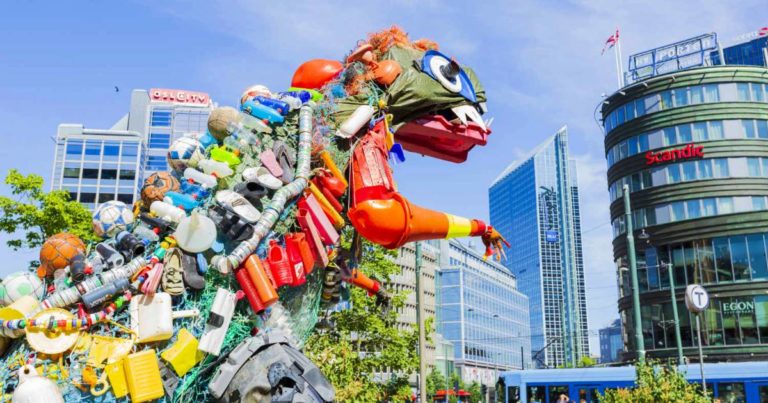The word is recycling: widely used in our daily lives, but what exactly does it mean? In the strict sense, recycling refers to the process of returning materials to their production cycle, transforming them into products with characteristics equal to those of the original material. However, over time, the use of this term has expanded to encompass a variety of practices that, technically, cannot be classified as recycling in the strictest sense. This post explores the concept of recycling, its uses in everyday life, and how the term has been used broadly and often incorrectly.

The Technical Definition of Recycling
The classical definition of recycling is closely linked to the materials cycle. The symbol of recycling — composed of three arrows that form a continuous cycle — represents the return of products to the production cycle: the first arrow is the industry, which manufactures the product; the second is the consumer, who uses the product; and the third arrow is recycling itself, when the material returns to its original state and can be reused in the manufacture of new products.
However, not all materials can be recycled in exactly the same way. aluminum, for example, is one of the few that can be recycled without losing its initial characteristics, which makes its recycling a technically correct process. Other materials, such as glass, plastic and paper, although recyclable, often do not return exactly to their original form.
- Glass: Although 100% recyclable, glass is rarely recycled in its original form. Most of the time, it is transformed into new products, with different characteristics.
- Paper: Paper recycling often requires the addition of virgin pulp, which means that recycled paper is rarely of the same quality as the original paper.
- Plastic and metals: Although recyclable, these materials rarely return to the cycle as the same product with all of its characteristics intact.
Therefore, if we use the strict concept of recycling, many materials could not be considered truly recyclable, and this would raise the question: Is it recycling or not?
Expansion of the Recycling Concept
The expansion of the use of the word recycling reflects an evolution in the way we deal with the consumption and disposal of materials. Over the years, the term has been expanded to include not only the return of materials to the production cycle, but also the reuse of products and the separation of recyclable waste.
Examples of expanded usage of the term include:
- “I recycled my trash” – When in fact I only separated the recyclable materials.
- “The city hall recycled” – When the public service only collected recyclables.
- “The waste pickers’ cooperative recycles” – When, in reality, all that was done was to sort the materials that will be recycled.
In an ideal scenario, all of these processes would be part of a complete recycling cycle. However, incorrect use of the word can create confusion about what it actually means. recycle.
Industrial vs. Artisanal
With the evolution of the concept of recycling, an interesting distinction has emerged between industrial recycling It is artisanal recycling. The first refers to the process in which waste is collected, processed and transformed into new products by the industry. This process requires large facilities, advanced technology and a logistics chain that allows the materials to be returned to the production cycle.
On the other hand, the artisanal recycling has gained prominence as a creative way to reuse materials, especially in communities and by artisans. Although often criticized for not significantly reducing the amount of waste, artisanal recycling plays an important role in environmental education and awareness. By transforming waste into handmade products, people begin to realize the value of discarded materials, which can lead to greater waste separation and increased awareness of recycling.
The Impact of Environmental Education on Recycling
One of the biggest challenges in increasing the rate of recycling worldwide is the lack of environmental education and awareness. People are often unaware of the importance of correctly separating their waste, or do not know which materials can be recycled. The expansion of the concept of recycling, although it caused some confusion, it also played an important role in engaging more people in the waste management process.
The initiative of the Recycling Sector is a clear example of this. Founded in 2000, the project began to gain relevance when it changed its focus from a technical discourse for experts, and began to speak directly to people who need to separate their waste at home and at work. By doing so, the project was able to reach a wider audience and began to educate about the importance of recycling, regardless of whether the word is being used in its most technical or expanded sense.
A artisanal recycling, for example, has the power to raise awareness about the importance of reusing materials and reducing waste. Although its impact on reducing waste is small compared to the industrial recycling, it can be a crucial starting point for changing mindsets.
The Importance of Awareness and Action
The question of “is it recycling or not” It may seem trivial, but deep down, the most important thing is that we are consuming more from the planet than it can offer. Therefore, we must adopt an approach that goes beyond simply using words and focus on concrete actions that help minimize environmental impacts.
The three fundamental practices we must adopt are:
- Reduce: Reduce the consumption of products that are not necessary and opt for items with a lower environmental impact.
- Reuse: Take advantage of the materials we already have, either through artisanal recycling, such as creating new objects from waste, or simply giving new uses to old products.
- Recycle: Dispose of waste correctly so that it can be recycled efficiently, preferably by industry.
These practices are part of a circular economy, in which materials are constantly reused and waste is minimized. However, for this to work, everyone needs to be involved in the process, from consumers to industries and governments.
Recycling in its Broadest Sense
The concept of recycling has evolved over time, and although it is often used broadly and imprecisely, what really matters is awareness and action. The recycling It is not just a technical process, but a practice that encompasses reuse, repurposing and environmental education.
Be it for industrial recycling, which transforms materials into new products, or by artisanal recycling, which creates objects from waste, both have their value and impact. The most important thing is that we continue to promote awareness about waste and the need for more sustainable management of the planet's resources.
So the next time you think about recycling, remember that the term can have several interpretations, but the ultimate goal is always the same: to reduce environmental impact and ensure that natural resources are preserved for future generations.
Is it recycling or not? Perhaps the answer is not so simple, but what matters is that we are all moving in the right direction by adopting more sustainable and responsible practices.
Check out other interesting facts about recycling clicking here.
Learn how to make art by recycling, Click here.
Summary




And that's it.
Sumemo, Maria, thank you for the support 😉
I would like to know more and we have goals to do Electronic waste recycling, we operate in Poá RS
Organic Reclamation and Alternative Energy Production through Social Technology
Collectors' Cultural House
Ksarosa